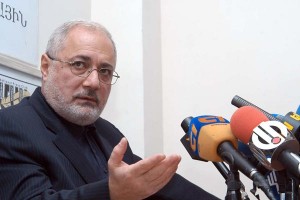The leader of the Armenian Revolutionary Federation’s faction in parliament, Vahan Hovhannesyan, discards as “not serious” the bellicose rhetoric routinely heard from Azerbaijan’s military top brass.
The latest such statement (of several surfacing since September 1) was made on Saturday by Azerbaijan’s defense minister Safar Abiyev, who – ignoring OSCE persuasion against such rhetoric – again spoke about the possibility of resolving the Karabakh conflict through the use of force. “If negotiations produce no result, a war with Armenia is inevitable,” the Azeri minister said bluntly, as reported by Azerbaijani media.
Armenia and Azerbaijan continue their internationally mediated talks and are said to be close to agreement on basic principles of settling the longstanding conflict.
Several international documents signed by Yerevan and Baku, in particular the November 2008 Moscow declaration of the two countries’ presidents co-sponsored by Russian President Dmitry Medvedev and the latest statement on Karabakh by the Foreign Ministers of the OSCE member states adopted in Athens on December 2, call on the parties to the Karabakh conflict to abstain from the use of force or even threats of the use of force in the process of settling the protracted dispute.
Commenting at ArmeniaNow’s request on the statement by the Azerbaijani minister, Hovhannesyan, who headed the Armenian parliament’s standing committee on defense, national security and internal affairs in 1999-2003, said: “I can reply to Abiyev using the words of Spartan King Leonidas (V century BC), who retorted to Persian King Xerxes’s demand of surrender by saying: ‘Come and get it’.” (The Greeks eventually proved victorious).
At a press conference on Monday, Hovhannesyan also spoke about steps that ARF-Dashnaktsutyun is going to take to attempt preventing the ratification of fence-mending agreements with Turkey. (Yerevan and Ankara signed protocols on establishing diplomatic ties and developing bilateral relations in Zurich, Switzerland, on October 10 this year. The agreements need ratification in the parliaments of both Armenia and Turkey to enter the stage of implementation.)
Hovhannisyan said that the party was going to stage numerous actions before and on January 12, the day when the Constitutional Court of Armenia is set to consider the constitutionality of the agreements.
“I can assure you, it will be very restless in the country during those days,” the parliamentarian warned, without elaborating.








